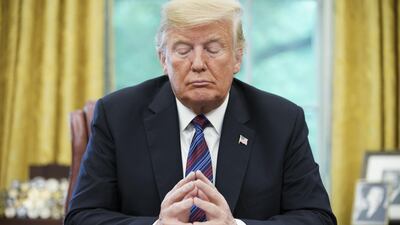The amendment to the North American Free Trade Agreement is being heralded by President Donald Trump as an achievement that overrides the previous trilateral pact that governs $1 trillion of trade between the United States, Mexico and Canada. However, the latest development leaves a number of issues unaddressed, notwithstanding America's trade deficit. The deal may have far reaching reverberations for the global economy and trade relations.
The “preliminary” agreement between Mexico and the US announced late on Monday implements changes to the 24-year-old Nafta with respect to cars, intellectual property, labour, digital trade and manufacturing. There is also an understanding that the new agreement will be reviewed every six years as opposed to a sunset clause that would have terminated the accord after five years.
The revised deal increases the regional vehicle production threshold from the US and Mexico to 75 per cent from 62.5 per cent originally prescribed in the 1994 Nafta agreement. The bilateral understanding also stipulates that as much as 45 per cent of car parts be made by workers earning at least $16 an hour, according to a statement from the US Trade Representative.
“There are some areas where the deal stands to be updated, notably on rules of origin, labour rights, wage minimums, intellectual property protection and digital trade,” said Cailin Birch, a senior commodities analyst with the Economist Intelligence Unit.
“While some revisions in these areas could actually help to modernise the deal, the US’s unilateral approach to this negotiation reflects a broader trend – that the US is gradually drawing back from multilateral co-operation, when it perceives this as not being on its own terms,” she said.
______________
Read more:
Details emerge of US and Mexico Nafta 2 deal, putting squeeze on Canada
US stocks hit record highs as Nafta replacement deal unveiled
______________
Markets and currencies reacted favourably to the news with the S&P 500 closing under 2,900 and the Nasdaq surging above 8,000, while Mexican peso and Canadian dollar rallied. However, the implications beyond the short-term don't bode well for global trade relations.
"This news looks rather like one of the few sunny days during the hurricane season," foreign exchange broker FxPro said. "It is increasingly likely that we will see a renewed pressure on Canada. In addition, having tasted the sense of victory in trade disputes, the Americans are unlikely to soften their rhetoric with Europe and China."
Mr Trump wasted no time in heralding the accord as a "big day for trade", however, trade unions held back from giving a full endorsement. Canada is yet to sign on and showed little enthusiasm that it is willing to acquiesce to US pressure.
“Global trade tensions have undoubtedly been the most significant source of risk in 2018,” said Hussein Sayed, chief market strategist at FXTM.
“Although investors finally see the light at the end of the dark tunnel, when it comes to China the tunnel may prove to be too long with lots of bumps along the way. However, it’s Canada what investors will be watching next,” he said.
The US and China have levied tariffs on each other this month. The $16 billion worth of duty on Chinese imports is minuscule next to Mr Trump's threat to raise tariffs on $200bn of Chinese goods, which he maintains will narrow the trade deficit with the world's second largest economy. Low inflation, a fast growing economy and a strong dollar have helped little in narrowing the gap.
The US trade deficit expanded in June for the first time in four months as imports rose and the value of exports dropped amid the escalating dispute with its trade partners.
Mr Trump has persistently used the trade deficit argument as an excuse to levy tariffs and renegotiate trade agreements.
“The US administration has a strong ideological desire to reduce the trade deficit which it believes results from unfair trade practices,” said Gregory Daco, head of US economics at Oxford Economics. “However, a renegotiated Nafta will not do much to the trade deficit as it is primarily driven by net domestic savings in the US which are likely to continue falling.”

